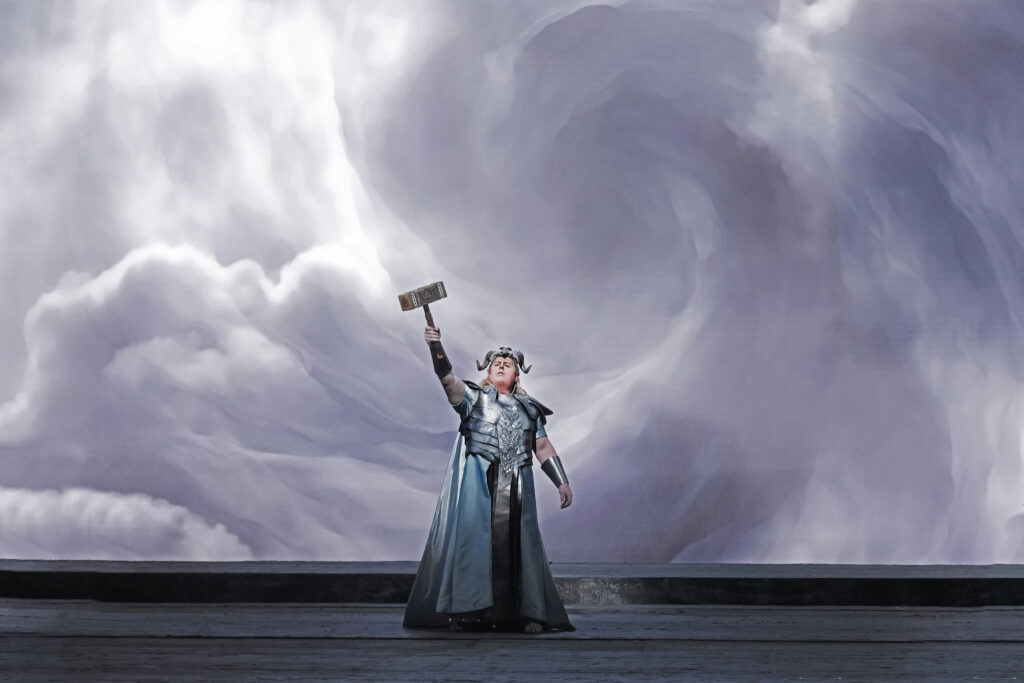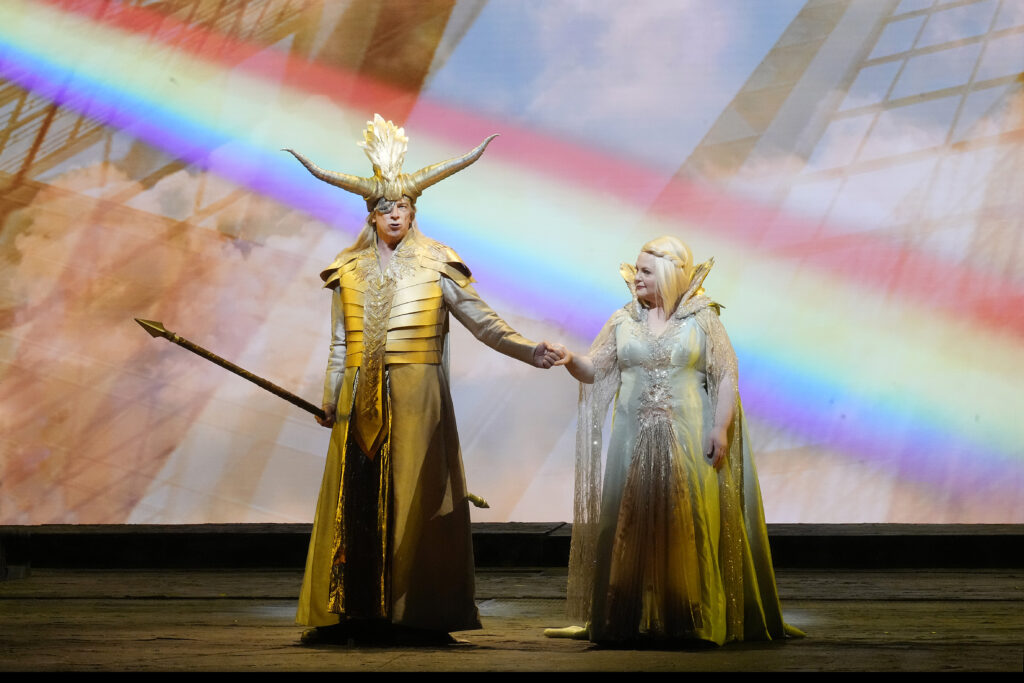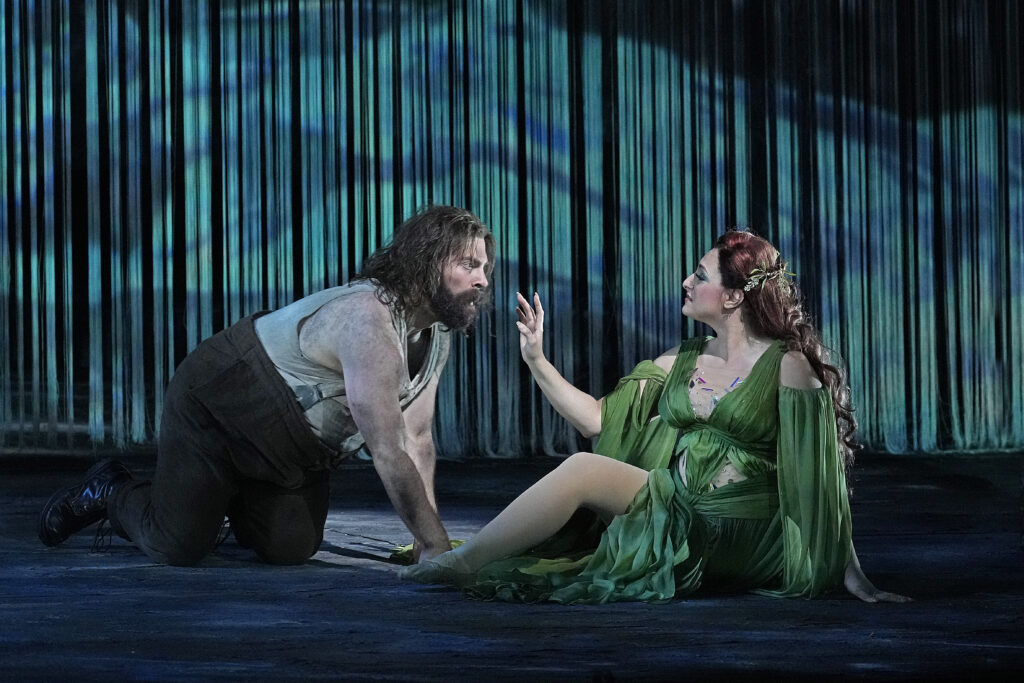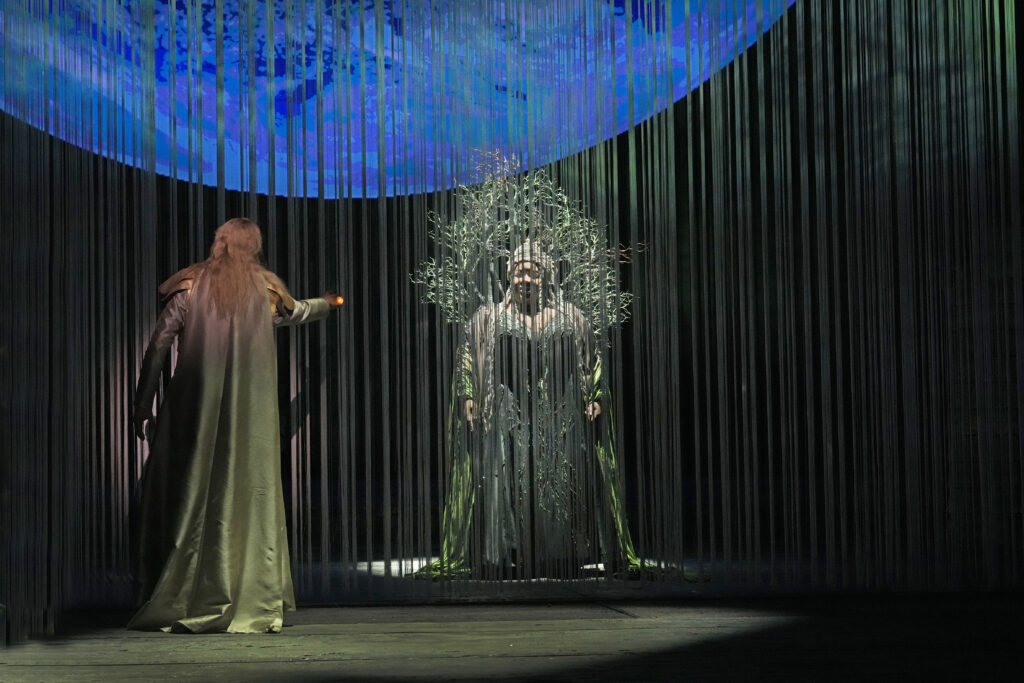This past Saturday evening, the Atlanta Opera company bid farewell to its 2022-2023 season this past with a performance of historic significance. For the first time in its history, before a sold out audience, the company unveiled Wagner’s Das Rheingold in a production designed to showcase the opera within its context as the first installment of Wagner’s monumental tetralogy. Das Rheingold serves as foundation to the bulk of the Ring Cycle, and if the opening night’s performance set the standard for the remaining three operas that complete the cycle, the Atlanta Opera is bound to set itself ahead of its southeast regional sister companies in a big way.
A collaboration with the Dallas Opera, this production of the Wagner’s Ring Cycle was originally slated to premiere at the Atlanta Opera during the its 2020-21 season. Up until this point, company’s relationship with Wagner in general had been tepid and often frustrating to long time patrons. Its sole Wagnerian offering, Der Fliegende Hollander, debuted on the company’s 23rd season and was reprised sixteen years later. For nearly 40 years, Atlanta would venture no further into the polarizing composer’s repertoire, and local Wagnerians, kept afloat by the occasional all-Wagner program offered by the Atlanta Symphony Orchestra (concert performances of Act III of Die Walkure featuring James Morris, Christine Brewer and Andrea Gruber are fondly remembered,) felt obliged to seek satisfaction in cities such as Seattle, San Francisco, Portland, Chicago, Los Angeles, Washington (#pout) and of course, New York. To those excited beyond measure at the Atlanta Opera’s announcement of its Das Rheingold premiere in January of 2020, the subsequent shelving of the entire season by nationwide lockdown restrictions seemed like a curse. The frenetic social and political rollercoaster bridging the temporary halt and last weekend’s premiere, however, have setup a uniquely relevant atmosphere for the themes explored in Wagner’s opus to resonate to modern audiences. The corruption of innocence and the weaponization of nature by renouncing love – and along the way – decency, reason and fairness – are all immediately relevant to the hashtags (#leitmotifs) that inundate our everyday. Das Rheingold may feature gods and giants, but when considering their present and future actions, it certainly offers no heroes.

Guiding the Atlanta Opera company through its first forays into Valhalla, stage director Tomer Zvulun, alongside a production team familiar with the company and its audience, have thankfully allowed the proceedings to unfold in a straightforward way: The absurdity of modern life is all the updating that is essentially required. The work of scenic and projection designer Erhard Rom served the production admirably when depicting naturalistic elements such as waves of the Rhine River or the rolling clouds that announce the arrival to Valhalla. The synergy between his projections and the work of lighting designer Robert Wierzel occasionally resulted in awe-inspiring imagery, such as the settling of the clouds as Fricka awakens Wotan. The costumes by Mattie Ullrich beautifully contrast the Elysian profile of the gods against the utilitarian garb sported in the Nibelheim and the organic, algae-inspired frocks worn by the Rheinmaidens. Some of Das Rheingold’s prohibitive stage trickery was resolved with varying success through the filmed media innovations of Felipe Barral and Amanda Sachtleben, which proved most impressive when depicting Donner’s hammer strike towards the end of the opera.
Tasked with the tremendous responsibility of bringing to life the nearly three-hour score without a break, maestro Arthur Fagen offered a solid, conservatively paced reading of the Gotthold Ephraim Lessing orchestra reduction of Wagner’s score on opening night. His orchestral phrasing was sumptuous (yet never pompous) and bold, allowing the brass section to assert itself in all its splendor, from the well realized vorspiel, a nerve-wracking fantasy in E-flat major for the horn section that expands 136 bars depicting creation, nature and the waves of the Rhine, to the exuberant sonic statements of the Valhalla and Sword motifs. Other highlights, such as the famous anvil sequence associated with the Nibelheim, proved less pristine. Maestro Fagen’s broad tempi also afforded his leading soloists the musical space to acclimate their resources as the long evening progressed.

For these performances, the Atlanta Opera should be credited with securing the services of Bass-baritone Greer Grimsley, who makes his Atlanta Opera debut with these performances. For over twenty years, he has cemented his reputation as one of the finest exponents of the role Wotan in the world today. The stentorian instrument is distinguished by a gritty timbre which the savvy artist uses to navigate the complexities of his august assignment. In sonic terms, he can unleash a torrent of sound which can both caress and roar past the orchestral wall of sound with little sign of effort. Though his tone has lost some youthful luster since we last heard him in the flesh (that was in 2014, when he unleashed an overwhelming Macbeth in Minnesota,) his declamation is steady and responsive in every register. In both vocal and physical statement, he embodied the god Wotan at the height of his physical powers – yet easily seduced by the restless political currents he himself is willingly aggravating (his hyperfocus on the ring during Alberich’s curse), and extra marital pursuits (his interest in Erda going beyond her mystical wisdom). Emotionally, his Wotan is at once proud, troubled, exuberant and sometimes cruel. We look forward to the development of his interpretation next season when the Atlanta Opera company offers the next installment of the Ring Cycle, Die Walkure. Mr. Grimsley’s participation has already been announced.
In the part of Wotan’s antithesis, the Alberich of baritone Zachary Nelson shared the evening’s superlatives alongside Mr. Grimsley. A young artist celebrating a decade in his professional career, Mr. Nelson, his first forays into the Ring (at Lyric Opera of Chicago, no less) were stalled by the pandemic. Perhaps eager to make up for lost time, he vividly immersed himself into an intense reading of the frustrated and power-hungry Nibelung elf. His baritone has all the hallmark of youthful exuberance: Bronze hued timbre, tremendous sonority and easy access to the upper tessitura. He established a frenetic presence across the footlights with reckless abandon, and one hopes he will husband his resources as the career develops: His is one that holds many promises.

In Das Rheingold, the tenor ilk was principally represented by tenor Richard Cox, who produced a serviceable interpretation of the misfit god Loge. An important player in Wagner’s Ring, Loge’s sole chance at the spotlight takes place in Das Rheingold (Loge makes a brief appearance in Die Walkure, but does not sing). Mr. Cox revealed a well-placed instrument graced by a naturally soft edge, which was rendered poetic when revealing the deeper introspective facets of the character. When negotiating the perky and fast turning phrases that reveal the character’s clever disposition, his instrument lacked the type of exuberant, bombastic quality that commands the attention through its sheer presence alone. That incisive element was more readily found in the singing of tenor Julius Ahn, who stole every scene in the Nibelheim through the short but important (as we will see two years from now) role of Mime.
Rounding off the leading men, baritone Joseph Barron and tenor Adam Diegel brought great swagger to their masculine impersonations of the gods Donner and Froh respectively, and were offset by the juxtaposing sentimental and ruthless disposition of the giants, brought to life in these performances by bass Kristinn Sigmundsson as Fasolt and bass Daniel Sumegi as Fafner. In Das Rheingold, the score favors Fasolt, and Mr. Sigmundsson projected an empathetic character desperate to add some joy and happiness to an otherwise miserable life at every turn. Mr. Sumegi as Fafner was wonderfully selfish and calculating. He will have an opportunity to expand on Fafner’s development in Siegfried, if its in the cards.
Leading the women of Das Rheingold, Elizabeth DeShong offered a well sung performance of the goddess Fricka as her introduction to the Atlanta Opera audience. A frequent artist featured at the great opera companies worldwide, Ms. DeShong offered a stately mezzo-soprano distinguished for its firmness of tone and hall filling dimensions. The middle voice in particular shone beautifully through the auditorium of the Cobb Energy Performing Arts Center. The ascent to the upper notes betrayed a slight hardness, which dissipated into the cacophony of the orchestra. Dramatically, her relationship with husband was understandably tentative, and though at times she put the audience on notice of her powers in reserve, she seldom chose to dominate the proceedings, either vocally or histrionically, delegating those duties to soprano Jessica Faselt, whose Freia was distinguished by clarion delivery, ad a gleaming, brilliant top register. An ideal contrast to Ms. DeShong. A solid trio comprised the aquatic delegation of Rheinmaidens led by the bright voiced Woglinde of soprano Cadie J. Bryan, the firm voiced Woglinde of soprano Alexandra Razskazoff, and that extraordinary member of the Atlanta Opera Glynn Studio Artists, dramatic mezzo-soprano Gretchen Krupp.

As Erda, mezzo-soprano Ronnita Miller uneasy and somewhat strained delivery of the crucial role of Erda raised a few reservations in an otherwise excellent cast. The voice is wonderfully imposing and fills the hall appropriately, but it managed said task through a hooty production which compromised pitch and steady emission. She was aided by maestro Fagen, who expedited her efforts against the grain of his otherwise expansive beat. Erda is a short part yet very exposed, and we hope Ms. Miller rises to the occasion in subsequent performances.
There are three more performances of Wagner’s Das Rheingold, including tonight’s performance at 7:30 pm (yes, I am rushing over there as soon as this post is published). Atlanta audiences are STRONGLY URGED to be a part of history. Rumor has it that single tickets for next year’s Die Walkure are already on sale! THIS-IS-IT, PEOPLE!
For more information on Das Rheingold and the Atlanta Opera, please visit the company’s website by visiting www.atlantaopera.org